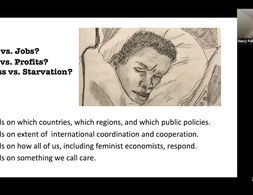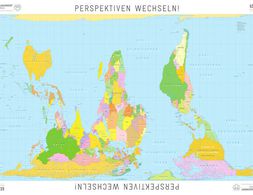438 Ergebnisse
This is an online panel and discussion on the ongoing and potential gendered impacts of COVID-19 organized by the International Association of Feminist Economics (IAFFE).
Exploring Economics, an open-source e-learning platform, giving you the opportunity to discover & study a variety of economic theories, topics, and methods.
How do people make decisions? There is a class of models in psychology which seek to answer this question but have received scant attention in economics despite some clear empirical successes. In a previous post I discussed one of these, Decision by Sampling, and this post will look at another: the so-called Fast and Frugal heuristics pioneered by the German psychologist Gerd Gigerenzer. Here the individual seeks out sufficient information to make a reasonable decision. They are ‘fast’ because they do not require massive computational effort to make a decision so can be done in seconds, and they are ‘frugal’ because they use as little information as possible to make the decision effectively.
Michael Kalecki famously remarked “I have found out what economics is; it is the science of confusing stocks with flows”. Stock-Flow Consistent (SFC) models were developed precisely to address this kind of confusion. The basic intuition of SFC models is that the economy is built up as a set of intersecting balance sheets, where transactions between entities are called flows and the value of the assets/liabilities they hold are called stocks. Wages are a flow; bank deposits are a stock, and confusing the two directly is a category error. In this edition of the pluralist showcase I will first describe the logic of SFC models – which is worth exploring in depth – before discussing empirical calibration and applications of the models. Warning that there is a little more maths in this post than usual (i.e. some), but you should be able to skip those parts and still easily get the picture.
Feminist economics is a key component of the movement for pluralism in economics and one that has, to some extent, been acknowledged by the mainstream of the profession. It seeks to highlight issues which affect women because (it claims) they have not traditionally been recognised in a field dominated by men. On top of this, it seeks to carve out a space for women in the discipline, both for intrinsic reasons of fairness and diversity and because it means that women’s issues are more likely to be highlighted going forward.
Economists like to base their theories on individual decision making. Individuals, the idea goes, have their own interests and preferences, and if we don’t include these in our theory we can’t be sure how people will react to changes in their economic circumstances and policy. While there may be social influences, in an important sense the buck stops with individuals. Understanding how individuals process information to come to decisions about their health, wealth and happiness is crucial. You can count me as someone who thinks that on the whole, this is quite a sensible view.
The effects of the 2020 pandemic on the Latin-American region: a thorough before-after analysis.
The most successful multialternative theories of decision making assume that people consider individual aspects of a choice and proceed via a process of elimination. Amos Tversky was one of the pioneers of this field, but modern decision theorists – most notably Neil Stewart – have moved things forward. At the current stage the theories are able to explain a number of strictly ‘irrational’ but reasonable quirks of human decision making, including various heuristics and biases. Not only this, but eye movements of participants strongly imply that the decision-making process depicted in the theories is an accurate one.
In both economics textbooks and public perceptions central banks are a fact of life. On the wall of my A-level economics classroom there was the Will Rogers quote “there have been three great inventions since the beginning of time: fire, the wheel, and central banking”, summarising how many economists view the institution. There is a widespread belief that there is something different about money which calls for a central authority to manage its operation, a view shared even by staunch free marketeers such as Milton Friedman. This belief is not without justification, since money underpins every transaction in a way that apples do not, but we should always be careful not to take existing institutions for granted and central banking is no exception. In this post I will look at the idea of private or free banking, where banks compete (and cooperate) to issue their own currency.
In the fifth part of the Economics of COVID-19 Webinar by SOAS, Jo Michell sketches out the effects of the COVID-19 pandemic on the wider macroeconomy and warns against a resurgence of austerity politics.
In this interview, the political activist, author and lecturer Dr. Vandana Shiva explains the linkage between ecology, feminism and economics along the lines of current effects and implications of the Corona-Crisis in India and around the world.
An essay of the writing workshop on Nigeria’s Readiness for and the Effect of the Fourth Industrial Revolution
An essay of the writing workshop on Nigeria’s Readiness for and the Effect of the Fourth Industrial Revolution
Oft werden Universitäten mit neutraler Wissenschaft verbunden und das von Dozierenden vermittelte Wissen als Abbildung der Realität wahrgenommen. Nur selten ist es Gegenstand kritischer Auseinandersetzungen. Wissenschaft findet jedoch in keinem neutralen Raum statt, sondern ist von Machtstrukturen und somit auch oft von diskriminierenden Denkweisen geprägt. Genau hier setzt unser Projekt an, mit dem wir einen Beitrag zur kritischen, interdisziplinären Auseinandersetzung mit Rassifizierung und Diskriminierung an der Universität Bayreuth und darüber hinaus leisten wollen. Unser Interesse am Thema Rassifizierung im Kontext universitärer Lehre und Forschung entstammt dabei der kritischen Auseinandersetzung mit den Lehrinhalten der Vorlesung „Ökonomik der Entwicklungsländer“ von Prof. Dr. Martin Leschke sowie mit dem begleitenden Lehrbuch „Ökonomik der Entwicklung – Eine Einführung aus institutionenökonomischer Sicht“. Als uns Themen und Begriffe auffielen, die unserer Einschätzung nach in ihrer Verwendung nicht dem aktuellen Umgang mit postkolonialen Machtverhältnissen und Eurozentrismus entsprachen, kam uns die Idee, eine kritische Begleitschrift zu besagtem Lehrbuch zu verfassen.
This paper starts with an evaluation of three common arguments against pluralism in economics: (1) the claim that economics is already pluralist, (2) the argument that if there was the need for greater plurality, it would emerge on its own, and (3) the assertion that pluralism means ‘anything goes’ and is thus unscientific. Pluralist responses to all three arguments are summarized. The third argument is identified to relate to a greater challenge for pluralism: an epistemological trade-off between diversity and consensus that suggests moving from a discussion about ‘pros’ and ‘cons’ towards a discussion about the adequate degree of plurality. We instantiate the trade-off by showing how it originates from two main challenges: the need to derive adequate quality criteria for a pluralist economics, and the necessity to propose strategies that ensure the communication across different research programs. The paper concludes with some strategies to meet these challenges.
In this essay, Professor Robert Pollin explores the short falls of the degrowth perspective in handling the impending environmental collapse as well as elaborates on the efficacies of a green new deal.
"Bank Underground" is the staff blog of the Bank of England, founded to publish the views and insights of the people working for one of the world's oldest central banks. The blog covers a wide range of macroeconomic topics, mostly linked to the effects of monetary policy, of course, but not all the time. It provides timely, relevant analysis of contemporary challenges in economic policy and is thus often a perfect primer.
Since the 1980s, the financial sector and its role have increased significantly. This development is often referred to as financialization. Authors working in the heterodox tradition have raised the question whether the changing role of finance manifests a new era in the history of capitalism. The present article first provides some general discussion on the term financialization and presents some stylized facts which highlight the rise of finance. Then, it proceeds by briefly reviewing the main arguments in the Marxian framework that proposedly lead to crisis. Next, two schools of thought in the Marxian tradition are reviewed which consider financialization as the latest stage of capitalism. They highlight the contradictions imposed by financialization that disrupt the growth process and also stress the fragilities imposed by the new growth regime. The two approaches introduced here are the Social Structure of Accumulation Theory and Monthly Review School. The subsequent part proceeds with the Post-Keynesian theory, first introducing potential destabilizing factors before discussing financialization and the finance-led growth regime. The last section provides a comparative summary. While the basic narrative in all approaches considered here is quite similar, major differences stem from the relationship between neoliberalism and financialization and, moreover, from the question of whether financialization can be considered cause or effect.
The article pursues the two related questions of how economists pretend to know and why they want to know at all. It is argued that both the economic form of knowledge and the motivation of knowing have undergone a fundamental change during the course of the 20th century. The knowledge of important contemporary economic textbooks has little in common with an objective, decidedly scientifically motivated knowledge. Rather, their contents and forms follow a productive end, aiming at the subjectivity of their readers.
On July 2020 ZOE-Institute published a unique platform for transformative policymaking: Sustainable Prosperity. Building on insights from new economic thinking the platform provides knowledge about ideas, arguments and procedures that support effective promotion of political change. It aims to strengthen change makers in public policy institutions, who are working on an ambitious green and just transition. As such, it provides convincing arguments and policy ideas to overcome the reliance of economic policy on GDP growth
This paper presents an overview of different models which explain financial crises, with the aim of understanding economic developments during and possibly after the Great Recession. In the first part approaches based on efficient markets and rational expectations hypotheses are analyzed, which however do not give any explanation for the occurrence of financial crises and thus cannot suggest any remedies for the present situation. A broad range of theoretical approaches analyzing financial crises from a medium term perspective is then discussed. Within this group we focused on the insights of Marx, Schumpeter, Wicksell, Hayek, Fisher, Keynes, Minsky, and Kindleberger. Subsequently the contributions of the Regulation School, the approach of Social Structures of Accumulation and Post-Keynesian approach, which focus on long-term developments and regime shifts in capitalist development, are presented. International approaches to finance and financial crises are integrated into the analyses. We address the issue of relevance of all these theories for the present crisis and draw some policy implications. The paper has the aim to find out to which extent the different approaches are able to explain the Great Recession, what visions they develop about future development of capitalism and to which extent these different approaches can be synthesized.
How did the coronavirus almost bring down the Global Financial System? What effects does monetary policy have on inequality? What role do Central Banks have in the social-ecological transformation? How could Central Banks tackle climate change? What is Central Bank Digital Currency?
What made the false assumption that saving the economy at all cost during a pandemic so popular? This paper discusses different pathways through the COVID-19 pandemic at national and international level, and their consequences on the health of citizens and their economies.
Recovery from the Covid-19 crisis provides a chance to implement economic measures that are also beneficial from environmental and social perspectives. While ‘green’ recovery packages are crucial to support economies tracking a low-carbon transition in the short-term, green measures such as carbon pricing are also key to improving welfare in the long-term. This commentary specifies the need for carbon pricing, outlines its implications for our everyday lives, and explains how it works alongside value-based change in the context of climate action and societal well-being.
Als Weltwährung wird die abstrakte Idee einer weltweit gültigen Währung verstanden, mit der manche Ökonomen das derzeitige Weltwährungssystem ersetzt sehen wollen.
This is an introductory level core course in macroeconomics for those expecting to take further courses in economics. It provides a theoretical and applied approach of introductory macroeconomics, with an international perspective and applications to account for the growing importance of the global economy and the rising openness of economies.
Recording of the Workshop “The collateral supply effect on central banking”, 04.02.2021, part of the "Next Generation Central Banking - Climate Change, Inequality, Financial Instability" conference by the Heinrich-Böll-Stiftung
Die Zukunft der Ökonomie wird digital sein. Daher ist es wichtig, schon heute die richtigen Weichen zu stellen und die digitale Infrastruktur mit einer Nachhaltigkeitstransformation zu verknüpfen. Ein Beitrag von Kora Kristof und Steffen Lange.
Jeden Freitag streiken weltweit Schüler/innen für unsere Zukunft. Sie fordern radikale Maßnahmen für die Einhaltung des Pariser Klimaabkommens ein. In diesem Seminar werden wir uns aus der Perspektive der ökologischen Ökonomie mit ihrer Kritik auseinandersetzen. Im Fokus stehen dabei Ansätze einer Postwachstumsökonomie.
Wer sich ökologisch und sozial verhält, wird dafür oft finanziell bestraft. Dies ist jedoch kein Naturgesetz, sondern hängt ganz erheblich von unserer Steuer- und Subventionspolitik ab.
Forderungen nach einer beschleunigten Dekarbonisierung werden häufig mit dem Verweis auf den Emissionshandel abgewehrt. Dabei wäre es vielmehr notwendig, dieses Instrument selbst zu hinterfragen und neu zu denken
Die Economists4Future wollten eine Diskussion über notwendige Konsequenzen der Klimakrise für die Wirtschaftswissenschaften anstoßen – was bisher aber kaum gelungen ist. Das liegt vor allem daran, dass der neoklassische Mainstream weiterhin Diskursverweigerung betreibt. Ein Beitrag von Franziska M. Hoffart und Michael Roos.
Wir nutzen Cookies. Klicke auf "Akzeptieren" um uns dabei zu helfen, Exploring Economics immer besser zu machen!































